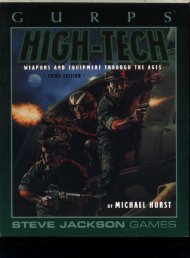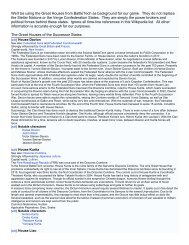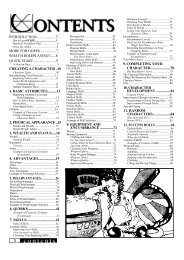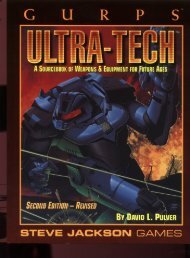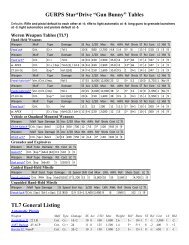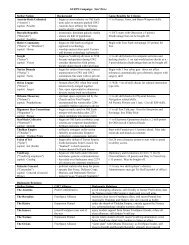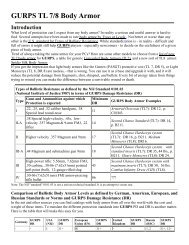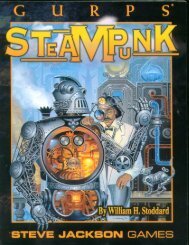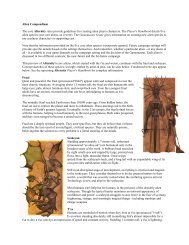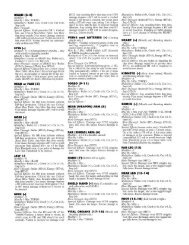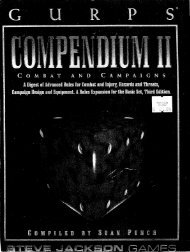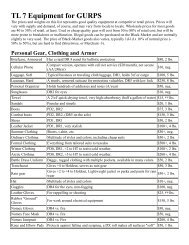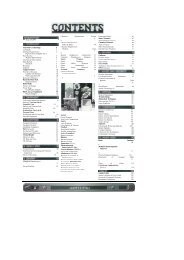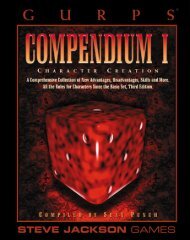Create successful ePaper yourself
Turn your PDF publications into a flip-book with our unique Google optimized e-Paper software.
The Mage’s Touch<br />
Touching a subject negates any distance<br />
penalty; a wand or staff may be used. And<br />
some attack spells require that the caster touch<br />
the subject. This is “the mage’s touch.” First<br />
the mage casts the spell. As his next action<br />
(assuming the spell roll was successful). the<br />
mage tries to strike his foe with his hand, wand<br />
or staff. In combat, roll this just like any other<br />
attack. If a touch is scored (the mage hits, and<br />
the foe’s defense fails) then the spell succeeds.<br />
If the mage misses, or if the foe defends<br />
successfully, the spell is lost. Note that PD<br />
from armor and shield will not normally help<br />
against the “mage’s touch,” and a parry with an<br />
arm won’t save the subject.<br />
A bare-handed or staff attack does its<br />
normal physical damage (if the mage wishes),<br />
in addition to whatever damage the spell does.<br />
A wand touch does no damage. Note that a<br />
wand is very light, and has a 1/3 chance of<br />
breaking if parried by anything heavier than a<br />
knife!<br />
The Mage’s Touch in Close Combat<br />
A wizard who steps into close combat with<br />
a foe and attempts a touch on the same turn<br />
must roll it as a normal attack; the foe may use<br />
any active defense.<br />
A wizard who is already in close combat at<br />
the beginning of the turn may “touch”<br />
automatically, unless both his hands are<br />
grappled or otherwise immobilized. In that<br />
case, he must Break Free, and then touch on a<br />
subsequent turn. However, since it is<br />
impossible to concentrate while in close<br />
combat, no spells can be used this way except<br />
those the mage knows so well that he can cast<br />
them in zero time!<br />
Skill 15-17: The wizard must speak a word or two and gesture - a couple of<br />
fingers are enough. He is allowed to move one hex per turn while taking the<br />
Concentrate maneuver. At level 15, the spell’s energy cost is reduced by 1.<br />
Skill 18-20: The wizard must speak a word or two or make a small gesture,<br />
but not necessarily both. At level 20, the spell’s energy cost is reduced by 2.<br />
Skill 21-24: No ritual is needed. The wizard simply seems to stare into space<br />
as he concentrates. Casting time is halved (round up), and if this would reduce<br />
casting time to less than a second, it takes effectively no time. The wizard can<br />
cast it while taking another maneuver - fighting, talking, etc. You still may not<br />
cast two spells during the same turn, unless one is a blocking spell!<br />
Skill 25 or over: As above, but casting time is halved again (round up, as<br />
above). At level 25, the spell’s energy cost is reduced by 3. Each further 5 levels<br />
of skill will halve casting time again and reduce energy cost by 1 more.<br />
Some spells always require a certain ritual or item; this is noted in the spell<br />
lists, and overrides the general rules given above. Note that time to cast missile<br />
spells is not reduced by skill.<br />
Distraction and Injury<br />
If the caster is hurt, knocked down, forced to use an active defense or otherwise<br />
distracted while concentrating, he must make a Will-3 roll to maintain his<br />
casting. A failed roll means he must start over. If the caster is injured while<br />
concentrating, his effective skill for that spell is lowered by the total number of<br />
hits he suffered.<br />
Example: While concentrating on a spell, Wat the Wizard is hit by an arrow<br />
for 2 hits of damage. He must make a Will-3 roll to maintain concentration. Even<br />
if he succeeds, he will be at -2 when he casts the spell.<br />
Energy Cost to Cast Spells<br />
Each spell has an energy cost. When you cast a spell, it costs you energy -<br />
either HT or ST. The better you know a spell, the less energy is required to cast<br />
it. If you know it well enough, you can cast it at no cost.<br />
The mana level of the area (see sidebar, p. 6/B147) affects a wizard’s effective<br />
skill. Low mana will also prevent his use of the Recover Strength spell (p.<br />
49/B162) and therefore the frequency with which he can attempt spells.<br />
If your basic skill with a spell (modified by mana level) is 15 or more, the<br />
cost to cast that spell is reduced by 1. If your skill is 20 or more, the cost to cast it<br />
is reduced by 2 - and so on. The energy is still going into the spell - but your skill<br />
lets you draw it from the surrounding mana rather than supplying it yourself.<br />
Thus (for instance) at Skill 20 you can cast a 2-die fireball (requiring 2 energy<br />
points) at no energy cost. To build it into a 3-die fireball, you would have to add<br />
1 point of your own energy.<br />
Note that the entire cost for a spell is calculated before any subtraction for<br />
high skill. A mage who can create many small fires, one after the other, at no<br />
cost, might still be exhausted by creating a single multi-hex fire.<br />
High skill also lowers the cost to maintain a spell - see below.<br />
Fatigue and Rest<br />
Normally, the energy cost from a spell is considered “fatigue.” Fatigue is<br />
marked off against ST on your Character Sheet, just as injuries are marked off<br />
against HT. When ST reaches 3, you are stumbling with fatigue, and your Move<br />
and Dodge scores are halved. When ST reaches 0, you fall unconscious. Your ST<br />
score cannot go negative.<br />
Lost fatigue can be recovered by rest - see p. B134. A mage who knows the<br />
Recover Strength spell (see p. 49/B162) regains lost ST faster than normal.<br />
PRINCIPLES OF MAGIC<br />
- 8 -



